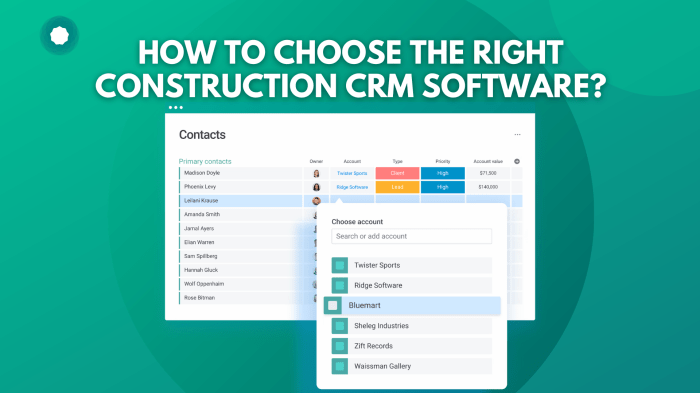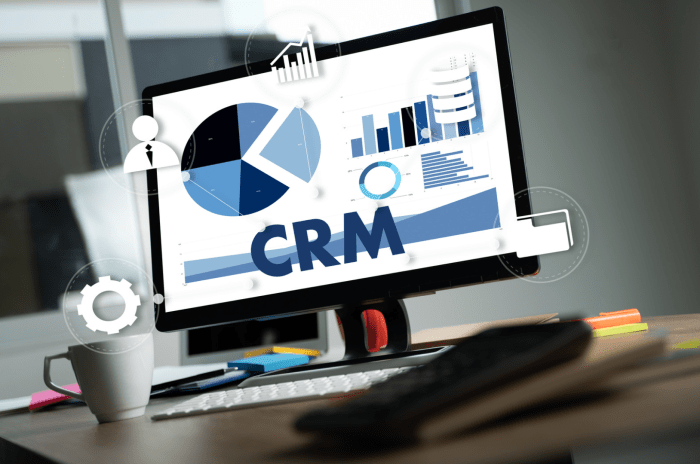Crm software for contractors – In the competitive landscape of the contracting industry, staying organized, managing client relationships, and tracking projects efficiently are paramount to success. This is where Customer Relationship Management (CRM) software steps in, offering a powerful solution to streamline operations and boost profitability. This comprehensive guide explores the benefits of CRM for contractors, delves into key features, and helps you choose the right software for your specific needs.
Why Contractors Need CRM Software
Contractors, whether specializing in construction, plumbing, electrical work, or landscaping, often juggle multiple projects, clients, and teams simultaneously. Without a robust system for managing this complexity, crucial information can easily get lost, leading to missed deadlines, unhappy clients, and ultimately, lost revenue. A CRM specifically designed for contractors addresses these challenges by centralizing crucial data and automating key processes.
This translates to:
- Improved Client Communication: Centralized contact information, project updates, and communication history ensures seamless interaction with clients.
- Enhanced Project Management: Track project milestones, deadlines, and budgets effectively, minimizing delays and maximizing efficiency.
- Streamlined Lead Generation and Management: Capture and nurture leads more effectively, converting inquiries into paying clients.
- Increased Team Collaboration: Facilitate seamless information sharing and task assignment among team members.
- Better Reporting and Analytics: Gain valuable insights into business performance, identifying areas for improvement and growth.
- Reduced Administrative Overhead: Automate repetitive tasks, freeing up time for more strategic activities.
Key Features of Contractor CRM Software
While the core functionalities remain similar across different CRM platforms, contractor-specific CRMs offer tailored features that address the unique needs of the industry. These features often include:
Project Management Capabilities
Effective project management is critical for contractors. A good CRM should offer:
- Task Management: Assign and track tasks, setting deadlines and assigning responsibilities.
- Milestone Tracking: Monitor progress against key project milestones, ensuring timely completion.
- Budget Management: Track expenses and revenue against project budgets, identifying potential overruns early.
- Document Management: Store and access project-related documents, such as contracts, blueprints, and invoices, centrally.
- Time Tracking: Accurately record time spent on projects for accurate billing and resource allocation.
Client Relationship Management (CRM)
Building and maintaining strong client relationships is essential for long-term success. Look for CRMs that provide:

Source: cjpath.com
- Contact Management: Centralized storage of client contact information, communication history, and project details.
- Lead Management: Tools for capturing, qualifying, and nurturing leads, improving conversion rates.
- Communication Tools: Integrated email, SMS, and potentially even video conferencing capabilities for seamless client interaction.
- Client Portals: Allow clients to access project information, communicate updates, and approve invoices online.
Reporting and Analytics
Data-driven decision-making is crucial for growth. Choose a CRM with robust reporting capabilities, including:

Source: centerpointconnect.com
- Project Performance Reports: Track project timelines, budgets, and profitability.
- Sales Reports: Monitor lead conversion rates, revenue generated, and sales trends.
- Client Relationship Reports: Analyze client engagement and satisfaction levels.
- Customizable Dashboards: View key metrics at a glance, tailored to your specific needs.
Integration Capabilities, Crm software for contractors
Seamless integration with other business tools is vital for efficiency. Look for CRMs that integrate with:
- Accounting Software: Automate invoicing, expense tracking, and financial reporting.
- Scheduling Software: Optimize resource allocation and project scheduling.
- Estimating Software: Streamline the bidding and proposal process.
Choosing the Right CRM for Your Contracting Business
Selecting the ideal CRM involves considering several factors:
- Business Size and Complexity: Smaller businesses might find simpler, less expensive solutions suitable, while larger firms might require more sophisticated features.
- Budget: CRMs range in price from free to thousands of dollars per month. Consider your budget and the value proposition of each option.
- Features and Functionality: Prioritize features crucial to your business operations, such as project management, client communication, and reporting.
- Ease of Use: Choose a CRM that is intuitive and easy for your team to learn and use.
- Scalability: Ensure the CRM can adapt to your growing business needs.
- Integration Capabilities: Check for compatibility with your existing business tools.
- Customer Support: Reliable customer support is essential for troubleshooting and resolving issues.
Popular CRM Software Options for Contractors: Crm Software For Contractors
Several reputable CRM platforms cater specifically to contractors. Research and compare options like JobNimbus, ServiceTitan, and Buildertrend. Each offers unique features and pricing models. Consider a free trial or demo to determine the best fit for your business.
Frequently Asked Questions (FAQ)
- Q: Is CRM software worth the investment for my contracting business? A: Absolutely! The increased efficiency, improved client relationships, and better project management offered by a CRM significantly outweigh the cost in the long run.
- Q: How much does contractor CRM software cost? A: Prices vary greatly depending on the features, scalability, and provider. Expect to find options ranging from free plans with limited functionality to several hundred dollars per month for comprehensive solutions.
- Q: How long does it take to implement a CRM? A: Implementation time depends on the complexity of the CRM and the size of your business. Plan for several weeks to a few months to ensure a smooth transition.
- Q: Can I integrate my existing accounting software with a CRM? A: Many CRMs offer integrations with popular accounting software like QuickBooks and Xero. Check the CRM’s compatibility before making a purchase.
- Q: What are the key metrics to track in a contractor CRM? A: Key metrics include project completion rates, client satisfaction scores, revenue generated, and cost overruns.
Resources
Call to Action
Ready to transform your contracting business? Explore the CRM options mentioned above, and choose the one that best fits your needs. Investing in a robust CRM is a strategic move that will enhance your efficiency, improve client relationships, and ultimately drive your business to new heights of success.
FAQ Overview
What types of contractors benefit most from CRM software?
Contractors of all sizes and specialties can benefit, from sole proprietors to large construction firms. The key is choosing a system that scales with your business needs.
How much does CRM software for contractors cost?
Pricing varies greatly depending on features, the number of users, and the vendor. Options range from affordable monthly subscriptions to more comprehensive enterprise solutions.
Is CRM software difficult to learn and use?
Many CRM systems offer user-friendly interfaces and intuitive designs. However, the learning curve depends on the software’s complexity and the user’s technical proficiency. Most vendors offer training and support.
Can CRM software integrate with other business tools?
Yes, many CRM systems offer integrations with accounting software, project management tools, and other business applications, creating a seamless workflow.
What are the key features to look for in a contractor CRM?
Essential features include contact management, project tracking, task management, reporting, and ideally, mobile accessibility.
